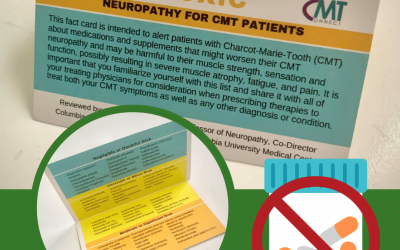Individuals affected with neuropathic diseases, such as CMT, may be more vulnerable to the effects of certain medical conditions, stresses, and medications.
A small number of medications are known to cause damage to nerves or cause neuropathy. These drugs can act as neurotoxins: substances that are poisonous or destructive to nerve tissue. Neurotoxic drugs can cause a loss of muscle control and/or nerve sensation.
CMT patients and their health care providers need to be aware about the medications that might worsen their neuropathy and be harmful to their strength, sensation, and function. Symptoms of CMT can remain dormant, only to be severely increased by a neurotoxic drug. Prevention of progression should focus on avoiding the medications that can affect any pre-existing neurological disease.
Most of the neurotoxic drugs fall into two broad categories: chemotherapies and antibiotics. However, numerous other treatments are also known to cause nerve injury and each must be evaluated before administration. With each medication, the risk of exposure must be weighed against the benefit of use.
There is only one example of a treatment that must be avoided in all circumstances. The chemotherapy agent vincristine may cause severe weakness and nerve injury after only 1 or 2 doses in patients with minimal or unknown CMT1A, the most common form of Charcot-Marie-Tooth.
While most all other treatments carry a relative, but not absolute risk of use, it’s imperative to always discuss any known family history of CMT with your health care providers before taking any medication.
The Hereditary Neuropathy Foundation has created a Neurotoxic Drug List for you and your health care providers. Please take time to review the list and reach out to us for all questions and comments.
For the complete Neurotoxic Drug List, click HERE.
We would also encourage any CMT patient whose symptoms were triggered or exacerbated by a prescribed drug to join the Global Registry For Inherited Neuropathies (GRIN). The registry collects the clinical and genetic information on patients diagnosed with the various forms of inherited neuropathies to help advance therapy development for these debilitating disorders.
For more information on GRIN and to join The Patient Clinical Registry, click HERE.







My rheumatologist wants me to take Hydroxychloroquine which is a chloroquine and I am concerned. Should I be?
Should my husband who has CMT11 be taking Sertraline ?
I have Cmt and was diagnosed in my 30s nobody never knew what I had. I’m so thankful we have Internet today because I had no idea about the cancer and not to have the treatments.
I ran across someone the other day her family has 3 realitive that have Cmt and had no ideal that’s what it was. Prayers to all and thanks for sharing.
Penny Keith, do you mind me asking what your symptoms were? I’m 36 and my aunts have CMT. Thank you! Carrie
I have sent my son that is 46 to foot doctor and had a nerve study and has had a CT can not figure out what is wrong with him. He walks on side of foot and toes are curled under. Now they want to send him to orthopedic doctor and he is also complaining his ankle hurts.
Does anyone out there have CMT and interstitial cystitis? So hard to find any info that links these 2 diseases.
I’m so sorry to hear this terrible ordeal with your husband and the cancer and vincristine. Can we talk offline? The same thing happen to me. Please email me and I will provide you with my cell phone. [email protected]
My husband has CMT and also has cancer. He has had 5 treatments and one of the drugs used was vincristine . Since he started the treatment he has become really weak and can’t hardly walk. He has Hodgkins lymphoma and is 70 years old. I don’t think the doctor paid any attention to the fact he has CMT, even tho it’s in all his health records and he’s been on pain medication for years. Doctor said we can refuse treatment but he’d probably die within 6 months. So what now? We risk he’ll never be able to walk again or die? It’s like the doctor messed up and now we just have to deal with it? He had a treatment Monday but I’m not sure if we’re doing the right thing?
Oh my goodness I am so sry. My prayers are with you both.. I was diagnosed with cmt. I have medical n thy don’t really care about ppl like us.. Finally at 30 thy caught it. I thank my doc all the time cause now I know what I have. Crazy. Prayers prayers and more prayers for you and your husband.
Hello Carla. My brother was diagnosed with lymphoma and has dealt with cmt throughout his life. He received a few rounds of chemo recently which contained the harmful drug that has a negative effect on cmt. He cannot walk and has recently been told that he will remain in a wheelchair. He is devastated and we are heartbroken for him. I was doing some research on this and saw your post. Would you mind sharing how things are going at this time? Thanks.
If you are able to adjust the drug list, I have some suggestions. Fluoroquinolones are listed in the “moderate to significant risk” category – appropriately. But Ciprofloxacin, Levofloxacin, Moxifloxacin, Trovafloxacin, Sparfloxacin and Lomefloxacin are listed in the “Uncertain to minor risk” category. All of those drugs I mentioned ARE fluoroquinolones and should be in the higher risk category. They all have the risk of permanent peripheral neuropathy noted on their warning labels. Here are more than 200 articles about the dangers of fluoroquinolones – http://floxiehope.com/fluoroquinolones-links-resources/. If you can make that change, your help will be appreciated!